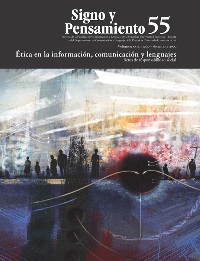Resumo
Este artículo presenta la perspectiva de una ética para la red o net-ética, que el autor ha identificado durante investigaciones realizadas en Colombia. En éstas se han realizado análisis relacionados con la educación, la administración, el diseño, la comunicación, el uso o la recuperación de información en internet, entre 1998 y 2007, particularmente la revisión teórica y el análisis crítico de un corpus de investigaciones. Dichos análisis han inducido nuevas preguntas y desafíos asociados al equilibrio entre la preservación de derechos fundamentales, como la libertad o la identidad cultural que un ciudadano, organización social o comunidad deben tener, y la normatividad moral que una incipiente ética en la red o net-ética vislumbra desde la cotidianidad y la reflexión filosófica.
Capurro, R. (2000), “Ethical Challenges of the Information Society in the 21st Century”, en International Information & Library Review, núm. 32, pp. 257-276.
— (2005), Ética de la información. Un intento de ubicación, en http://www.prodei.net/ebook/ ebook2/pdf/Capurro2.pdf, consulta del 6 de julio de 2008.
Cortina Orts, A. (1994), Ética de la empresa: claves para una nueva cultura empresarial, Madrid, Trotta. Floridi, L. (2006), “Ética de la información: su naturaleza y alcance”, en: Isegoria, núm. 34, pp. 19-46.
Galván, J. M. (2003), “On Technoethics”, en IEEERAS Magazine, núm. 10, pp. 58-63.
Gips, J. (1995), “Towards the Ethical Robot”, en Android Epistemology, en http://www.cs.bc.edu/~gips/EthicalRobot.pdf, consulta del 7 de diciembre de 2008.
Himanen, P. y Castells, M. (2002), El Estado del bienestar y la sociedad de la información: el modelo finlandés, en Alborés, J. (trad.), Madrid, Alianza.
Himanen, P.; Torvalds, L., y Castells, M. (2002), La ética del hacker y el espíritu de la era de la información, Barcelona, Destino.
Holsti, O. R. (1969), Content Analysis for the Social Sciences and Humanities, Reading, MA, Addison-Wesley Publishing Company.
Klein, P. (1992), “Stamping Out Jobs”, en InformationWeek, núm. 9, pp. 8-10.
Krippendorff, K. (1980), Content Analysis: An Introduction to its Methodology, Newbury Park, CA: Sage.
Latour, B. y Weibel, P. (eds.) (2005), Making Things Public: Atmospheres of Democracy, Cambridge, MIT Press.
Parker, D. (1968), “Rules of Ethics in Information Processing”, en Communications of the ACM, vol. 3, núm. 11, pp. 198-201.
Samuelson, P. (1991), “Digital Media and the Law”, en Communications of the ACM, vol. 10, núm. 34, pp. 23-28.
Stallman, R. M. (2004), Software libre para una sociedad libre, Madrid, Traficantes de Sueños.
Straub, D. W. y Collins, R. W. (1990), “Key Information Liability Issues Facing Managers: Software Piracy, Proprietary Databases, and Individual Rights to Privacy”, en MIS Quartely, vol. 2, núm. 14, pp. 142-156.
Straub, D.W. y Nance, W. D. (1990), “Discovering and Disciplining Computer Abuse in Organizations: A Field Study”, en MIS Quartely, vol. 1, núm. 14, pp. 45-60.
Wiener, N. (1950), The Human Use of Human Beings, Boston. Mass, Houghton Mifflin Co.
Esta revista científica se encuentra registrada bajo la licencia Creative Commons Reconocimiento 4.0 Internacional. Por lo tanto, esta obra se puede reproducir, distribuir y comunicar públicamente en formato digital, siempre que se reconozca el nombre de los autores y a la Pontificia Universidad Javeriana. Se permite citar, adaptar, transformar, autoarchivar, republicar y crear a partir del material, para cualquier finalidad (incluso comercial), siempre que se reconozca adecuadamente la autoría, se proporcione un enlace a la obra original y se indique si se han realizado cambios. La Pontificia Universidad Javeriana no retiene los derechos sobre las obras publicadas y los contenidos son responsabilidad exclusiva de los autores, quienes conservan sus derechos morales, intelectuales, de privacidad y publicidad.
El aval sobre la intervención de la obra (revisión, corrección de estilo, traducción, diagramación) y su posterior divulgación se otorga mediante una licencia de uso y no a través de una cesión de derechos, lo que representa que la revista y la Pontificia Universidad Javeriana se eximen de cualquier responsabilidad que se pueda derivar de una mala práctica ética por parte de los autores. En consecuencia de la protección brindada por la licencia de uso, la revista no se encuentra en la obligación de publicar retractaciones o modificar la información ya publicada, a no ser que la errata surja del proceso de gestión editorial. La publicación de contenidos en esta revista no representa regalías para los contribuyentes.


